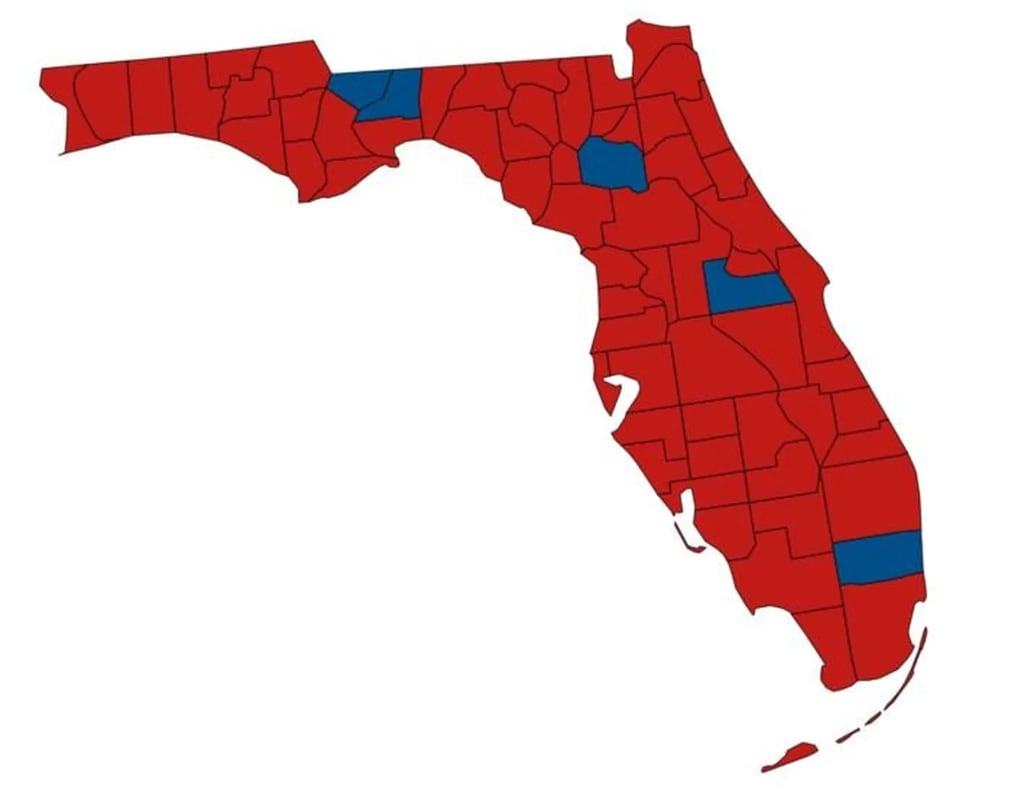How Florida Turned Red: Exploring the Factors Behind the State's Political Shift
From Swing State to Republican Stronghold - Understanding the Transformative Factors

Introduction
Florida, once known as the quintessential swing state, has undergone a significant political transformation in recent years, shifting from its reputation as a bellwether state to a solid red stronghold. In this article, we will delve into the various factors that contributed to this change and examine why Florida is no longer considered a battleground state in national elections.
Influx of New Residents
Subtitle: Pandemic Migrants and Florida's Growing Republican Base
Between the onset of the COVID-19 pandemic and the 2022 midterm elections, approximately 4 million registered voters in the United States moved to different states, with roughly one in seven of these voters settling in Florida. While this migration of new residents had the potential to impact the state's political landscape, the key factor was the political affiliation of these new arrivals. Many Republicans, disenchanted with lockdowns and restrictive policies in their home states, migrated to Florida, bolstering the state's Republican base.
The impact of this migration cannot be understated, as it brought in about 100,000 new Republican voters. However, considering that Florida had over 8 million voters, the sheer numbers were not enough to swing the election decisively in favor of Republicans.
Shifting Latino Voters
Subtitle: The Latino Vote in Florida - A Growing Republican Bloc
Florida's evolving Latino population played a crucial role in the state's shift to the right. Historically, Latino voters in Florida leaned Democratic, but recent trends have shown a significant shift towards the Republican Party. In the 2022 elections, the state's Latino voters overwhelmingly supported Republican candidates.
This shift can be attributed to the diverse Latino demographics in Florida, which includes a sizable Cuban population, as well as growing communities from Venezuela and Colombia. Republicans effectively targeted these groups through messaging that highlighted their opposition to socialist policies, drawing parallels between Democratic candidates and the socialist leaders of these countries.
The shift in the Latino vote is further evidenced by Florida's unique demographic makeup compared to other states with large Latino populations. While Latinos in other states, such as the Southwest and Midwest, are predominantly of Mexican origin, Florida boasts a diverse Latino population, with significant Cuban, Venezuelan, and Colombian communities that have increasingly aligned with the Republican Party.
Republican Party Dominance
Subtitle: The GOP's Stronghold in the Sunshine State
One of the standout reasons for Florida's political transformation is the sheer dominance of the state's Republican Party. Florida's Republican Party is the best-funded state party in the country, raising over $140 million in 2022. In stark contrast, Florida Democrats only managed to raise $27 million.
Furthermore, an increasing number of voters in Florida are registering as having no party affiliation, particularly among younger demographics. This shift further weakens the Democratic Party's influence in the state and cements the Republicans' hold on power.
National Democrats' Abandonment
Subtitle: Retreat of National Support - Implications for Florida's Political Future
National Democratic Party organizations, along with their Senate and House election committees, significantly reduced their financial support for Florida candidates in the 2022 election. This abandonment reflected a strategic decision to allocate resources to states where they had a better chance of winning.
In Conclusion
Subtitle: The Future of Florida's Political Landscape
Florida's transformation from a swing state to a solid red stronghold can be attributed to several key factors. The migration of new residents, the changing political preferences of the state's Latino population, the Republican Party's dominance, and the retreat of national Democratic support all played a role in reshaping the state's political landscape.
While Florida is firmly in the Republican camp today, its political future remains uncertain. It could potentially swing back in future elections if the right conditions and candidates emerge. This shift underscores the ever-evolving nature of American politics and the significance of demographic changes in shaping the electoral map. As Florida continues to redefine its political identity, it remains a state to watch in the ever-changing landscape of American politics.
About the Creator
Enjoyed the story? Support the Creator.
Subscribe for free to receive all their stories in your feed. You could also pledge your support or give them a one-off tip, letting them know you appreciate their work.






Comments (1)
This is great and very interesting! Fantastic!